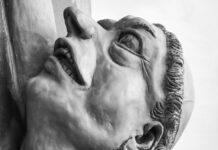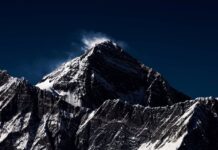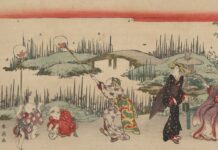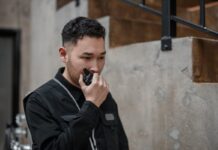A road separating white walls curved upwards into a forbidden-zone, precipice, interminable Sunday, Gypsies in dim doorways staring with worried wonderment at Woulther and Andy, Andy whispering: “Move!”
A landing crow, opening its wings, rocked down sloping terra cotta, claws scratching tiles, the bird stopping dead.
Cowering dogs’ irises in shadows gleamed warily in sedation-sapped silence, decency’s flimsy spine snapping, quaint courtesy gone on the wings of amoral flight.
A microphone bellowed out speech. Hands clattered. Woulther’s head shot up.
“Albanian?” he asked.
“No way,” Andy replied.
Jacketed, white-shirted Cézanne-like chess players at a timber table around a bend, momentarily exhaled civilisation’s relieving breath.
They held theirs as the narrow street, opening at the top of the hill, revealed a troop carrier in a cobblestone square. A Serbian flag covered a thirty-metre-long wall. People were holding placards: Let the Russians in. We’re not criminals. I want my father back. We need doctors, heads packed before a man shouting on a stage, brown, black, blonde heads united in hope, facing that flag.
Ignorance swished in hissing-steam trepidation inside Andy’s head. Friendly faces added surreal confusion to his bubbling uncertainty.
A woman, with long, dark hair, and protuberant breasts, spied him from a rooftop. Being observed by beauty emphasised that everything had been spun around, the airborne parts from violent change still seeking their places of permanent fall.
Soldiers, dashing through the square in a jeep, caused crows to sail from the wall the flag emblazoned, ebony wings like dark thoughts soaring from a red-blue-white abstraction, beaks screeching, eyes wild.
Are those soldiers Russians? Andy wondered. Are they already here? Or are they Dutch? Is this crowd’s cheering actually jeering? Am I being paranoid?
A chocolate-skinned teenager insisted Andy photograph a sign that listed atrocities committed against Serbs. The teenager’s skin glowed, like the charity of his heart, his eyes, igniting with amiable ebullience, like mica blazes of enthusiasm. He directed Andy to a sign held by a boy that said: My father isn’t a criminal. The teenager’s trepidation-eliminating warmth reduced fear.
Andy’s clicking camera chirped. The teenager patted him on the back with a confident amiability that contrasted with the gloom of a man who said: “They massacred sixty people in a church.”
The man’s glazed-eyed, long-term-unemployed look emphasised his premature ageing, time’s grey dust cast over his black head. His resigned shoulders rose and dropped. Bushy eyebrows emphasised the depth of his crater eye sockets.
“People just disappeared,” he said. “Never seen again……”
The skin around his eyes looked bruised. His eyebrows and shoulders rose – again – with melancholic frippery. Facts were facts. Only the Serbs were murderers. So the West said.
A woman, with big, round glasses, like transparent wheels, remarked: “They find bodies. Some don’t know who are.”
She hit the air to indicate mutilation. Outrage burnt in her blue-moon eyes.
“Oo Chi Car,” (UCK) she said. (Kosovo Liberation Army). “Why are Western governments supporting terrorism?”
She is, Woulther thought, innocently ignorant, conflicts fuelled by blindness to big pictures.
A tunnel of curiosity, formed by people’s faces, faced his face, the bespectacled, wheel-faced woman at its head.
“I wish I knew,” he lied.
A lunar-skinned woman in black faced a photographer’s lens, conflict turning that ancient statue of wrinkles into a celebrity, the powerful adding to their own celebrity by starting wars they dream of winning.
A helicopter’s lawnmower rumbling caused hands to sway above heads in a collective hello.
“Russians,” a teenager, with a warm, charming, disarming face, remarked, pointing upwards.
The teenager’s blue eyes glowed peacefully, his smile like a light of open tranquillity that shone from within the sea-blue, opal-like slithers that evolution had placed into his rosy-cheeked face, the fires burning on his cheeks made striking by the snowy whiteness of his hair, the tricolours of Serbia and Russia ironically in his appearance from his neck up.
“I had Albanian friends before the war,” he said. “I’d like to know where they are. But it’s impossible for me to see them. They live in the valley.”
His smile was tearful, his sincerity graceful, like gratitude.
“Maybe,” Andy offered, “you’ll be able to see them sooner than you think.”
Sasha smiled.
“That would be nice,” he said, “but that’s impossible; it’ll be impossible for years – maybe forever.”
Sasha stared at where mountains rising from the town met the sky.
“I just want to finish school,” he said, “and get a job, and make money, and have a great life, just like you. But….”
A rush came up Andy’s throat.
“No teachers here?” he asked.
“No books, papers or pens. Everything is down there,” Sasha said, “in the valley. I won’t be going to school for years.”
A Gypsy woman ran through the square. Her eyes shone weirdly, as if she had swallowed a hallucinating potion, her hands waving like wind-tormented trees, her shrieking resembling air rushing through a narrow gap between two walls.
“Oo Chi Car,” Bushy Eyebrows said.
His voice had become the universal device for measuring resignation. His eyebrows rose, then fell, dropping like stones. His black hairs’ grey ends looked unnatural, as if a make-up artist had produced a false impression of ageing, like a character in a soap opera. And aging seemed appropriate, for everyone there had been forced into unwanted, early retirement – including the teenagers.
Soldiers in a jeep drove up the winding road that the Gypsy had entered the square from. People followed, the unpaved thoroughfare meandering between twisting walls that met behind a house where the jeep stopped, where German soldiers were standing beside crying women’s huddled heads, the women like solace-seeking ducklings in colourful skirts that, shimmering in the light that fled off the white walls, seemed to reverberate from the wallop of an unexpected blow.
The Germans got the kidnapped man’s ID. The victim’s mother’s blue eyes looked gripped by malign visions. She slid down a wall, her chest heaving, her alert eyes blinded by a horrifying fact impossible to ignore. Her throat throbbed in gasps of shocked breath, the huddled women’s whimpers lost to her ears. She panted like a wounded animal, her chest heaving like a wild sea.
Andy glimpsed her son’s face on the ID. Black hair. Broad face. Flat cheeks. Another statistic in the mounting mistrust of millennium.
The Germans asked questions dispassionately, like public servants performing a perfunctory task. A woman wearing a floral apron – a strangely happy garment of repression – responded calmly. She pointed to the mountain above. The Albanians had come down from there, amorally free as victors are in the battle against self-doubt that rages intermittently within.
The soldiers, searching for the corpse, headed into where violent righteousness seethed in a misleading quiet of benign distance, up to where the world ended for the minority in the town below, the mother whining like a bird being hounded by a cat, her grief making the wind howl more intensely, and the sunlight gleam more bitterly upon the walls, her X-ray eyes Death’s skeleton upon her retinas.
Andy had never heard before the sound shrieking from her mouth: a high-pitched howl of heavy-breathing terror created by everything being eliminated from the future except despair.
No photography, Andy thought, this situation slashed badly enough as it is with voyeurism’s sharp-edged steel without me adding to it, the scene etched, everlastingly surreal, by memory’s cameras onto my mind.
The observers left the women to their despair. New stories would arise elsewhere, tragedies acknowledged and forgotten by our need for distraction.
Woulther and Andy were invited to a rooftop terrace, a stone stairwell reaching where red-and-white-checked tablecloths covered tables. People were playing cards. A shadow, climbing up a column on the rooftop’s edge, stretched across the floor like a mental scar across where these people socialised. People coming up the stairs flopped on chairs, Andy and Woulther the only two with money to buy drinks. The rest were imprisoned, their surrounding enemies motivated by voluptuous revenge.
Before sitting, the people stared over the balustrade at a world no longer theirs. Horses in hazy languor on green fields below kissed fertility. Tilted orange roofs framed plummeting land. Far-away mountains turned purple. Globules clung to peaks in silent blazes of vapour. Jewelled leaves obscured roofs. Glinting vehicles, like shiny beetles, crawled below, beauty masking danger, as beauty often does.
Andy thought: An unsatisfied lust for visual stimuli – claustrophobic imprisonment because of politics – creates fantasies of killing; therefore the prisons must be eliminated.
A man, arching his back, swept his hands through his hair before wiping his face, habits enacted from unwanted inaction. The man went to the balustrade; he stared down, not moving, stagnant before his lost past.
The Albanians had blocked the village. The only way out for Serbs was in coffins. The soldiers who had dashed through the square had been Dutch, not Russian, reducing Woulther and Andy’s concerns.
The man at the balustrade sauntered back to his chair and flopped back down, like dead weight, his mouth tight under intense eyes, another lap completed in a contracting capsule of frozen time.
Clouds’ shadows slipped over the slopes that rose behind the town, slipping silently over purple-tinted rocks under marshmallow vapours, clouds puffed up, like illusions, against blue.
“Before the war,” Sasha said, “we would go up there with our girls, take wine, and have fun.”
Uprising nature fights remorseless gravity, opposing forces locked in constant battle, like warring tribes, like a contest between high curiosity and grounding fear.
“But now for two years,” Sasha continued, “nobody goes out at night. People disappear. Things don’t change.”
The mountains, once symbolising freedom, were now barriers where clouds’ shadows slid, like silent spirits in amoral serenity, across the salient past.
A sleeping cat on a chicken coop’s roof across the road was surrounded by crows, cat paws splayed out, the birds calm.
“It’ll be different,” Sasha said, smiling, “when the cat wakes.”
Smoke from a fire hung over distant roofs, the gaseous column dissipating into blue. Featureless mountains became mauve, like events consumed by purple-history haze.
“They burn Serbian houses every day,” Sasha said.
The Serbs, who once lived below, had concentrated themselves under NATO protection in their relatives’ houses at the top of the hill.
The smoke, merging tranquilly with the sky, looked so dream-like it felt as if destruction wasn’t possible, the heat inducing such languor that it seemed ridiculous that anyone could amass the ferocious enthusiasm necessary to engage in destruction. But revenge, that fire of ferocious enthusiasm, burns under all conditions.
“Down there,” Sasha said, “is my house. We’re now living up here with relatives.”
His family’s house’s burnt rafters protruded through a fractured-ribcage roof, as if a giant fist had clobbered the roof’s tiles with an almighty thump, black fire stains, above missing windows, like bruises upon his house’s white walls. Crows danced upon the undamaged chimney, everything gone from within, a shattered past salient, its remnants lingering, like a long penance, in the world’s depression.
Woulther and Andy wanted to investigate the burning houses. Their appreciation unfolded in handshakes, promises of returns made. The most depressed had returned to the balustrade; he gave a quick wave, no smile, too drained of enthusiasm to socialise.
Down the hill, German soldiers stared at Andy and Woulther, as if observing bizarre animals in a zoo, the soldiers’ faces punctured with astounded opals, their heads swollen by khaki helmets, leather straps tight under their chins.
“Was machen Sie hier?” one asked.
The soldiers’ black-pupil moons in azure skies glared like the Gypsies’ eyes below.
“Visiting friends,” Andy replied.
“Friends?!”
The soldiers stared as if eyeing escapees from an asylum.
They’re having, Andy thought, the Olympic-gold-medal experience of surprise.
These people have chosen to come here!? Hierrrrr!! Andy imagined them thinking.
A soldier rang the UN on a satellite phone to see if Andy and Woulther’s organisation had permission to be in Kosovo. The soldier clutched their ID cards. He talked while facing a wall. Another type of uncertainty shimmered inside Andy’s head, his future again in doubt.
“Yes,” the soldier was told, “but they shouldn’t be where you are.”
The UN had banned NGO’s from helping Serbs, claiming this would put NGO workers under threat from Albanians.
The soldier asked: “Was wollen Sie hier?”
He spun so quickly that Andy thought he was going to be arrested, shimmering trepidation tinsel inside his head flashing again with metallic brilliance.
“I just told you,” Andy replied. “Are we being arrested?”
Facing unflinching eyes stared…….The soldier’s leering unsociability matched the Gypsy’s, except that the soldier was fearless – his eyes fuming with astonishment.
“Are we?” Andy re-iterated.
The soldier handed back their ID’s and said: “Go!”
“A Dutchman and an Englishman,” Andy said, as they fled down the hill, “harassed by Germans in the Serb section of an Albanian town in a province called Kosovo under UN administration in a country once called Yugoslavia.”
“These Serbs,” Woulther said, “are in a minimum-security prison, minimum from the wrong direction – getting in! – and that is a joke!”
The dim doorways stilled housed leering Gypsy eyes, squawking birds still bouncing above. The Gypsies had sided with the Serbs in the recent conflict, the Albanians hence wanting them dead.
The street’s curves limited distances to ten metres. Later, after discovering how many people were dying where they had just been, Andy thought: Bravery is curiosity fired by ignorance, life a fight between fear and curiosity, the victor’s name alternating between the two in the psychological draft system that underpins action versus restraint.
They passed a tank where the precipice-Sunday road began. Empty, blue eyes stared down from the tank’s mount, those creatures below merely insects that had just crawled up and down the slope of a steep nest. Not an ounce of inquisitiveness shimmered those dulled, Dutch irises that so-called peace had sapped of hawk-eyed gusto.
At least, Andy thought, the Germans had been astounded!
Back where their presence wasn’t considered to be suspicious, tension disappeared, a smoke column luring them on. They were still too inexperienced to understand that Andy looked like an Albanian and that Woulther’s black clothes resembled those of the KLA, who, soaking up glory, still wandered around in black. Andy and Woulther’s inexperience had been so extreme that obvious, pertinent details weren’t conveying deeper meanings – yet. But realising their ignorance they weren’t clinging to cherished perceptions of a Big Picture; neither were they facing blame’s challenges; hence they had the luxury of rational investigation.
The rising, exhaust-like smoke stained the sky, coiling black vapours pouring from a roof. DNA strands of snake-like gas, fleeing upwards from the smashed windows of architectural death, disappeared into blue.
Caution halted Andy and Woulther at the house’s driveway. The people in the backyard of that house may have been displeased about foreigners observing “ethnic cleansing”. And why wasn’t KFOR stopping these arsonists? Andy thought.
Five boys emerged from the house’s backyard. The eldest one announced: “Criminals lived here.” Sheepish defiance smeared the boys’ faces.
Andy hadn’t been expecting children. A preconception exploded in his head, obliterated by experience.
Because the arsonists were only kids, they headed for the burning house’s back garden. Propaganda had made Andy and Woulther assume that Official Burning existed, as though houses were being torched by the KLA as part of a calculated program of Serb elimination. Propaganda reduces motives down to the political, allowing the victim to believe that organised forces, epitomising the enemy’s supposed genetic maliciousness, is using the victim for nefarious pleasure – and nothing else.
Vines covered the house’s rear-garden patio, the ground littered with smashed tiles and burnt timber. Sunlight mottled the rumble carpet. Butterflies danced over flowers beside broken bricks.
Woulther observed broken building materials on the floor of an annexe. Rusting, twisted metal, in smashed plaster, lay under jagged wall tops. A now useless faucet protruded from a roofless wall. Fractured plaster revealed cracked bricks. Burnt timber covered the floor. Fantastic shapes abounded – like picturesque sculptures of destruction.
Woulther, observing furious orange burning upon the main roof’s blackened rafters, thought: Rubble is aesthetic. At dusk in Gjakovar, you see chimney silhouettes rising over the varying heights of remaining walls, like elegant, Jacobean-style destruction. I wonder if rubble is an artistic reflection of the aeons of violence that constitute our history? As if our minds, forever adaptable for reasons of survival, have discovered how to beautify our ugly experience? There’s an exotic sense of rubble having come from another world – perhaps from the accumulated unconscious – as though its appeal is part of that process that drives us to want to see the difficult to see, that makes us want to experience first-hand the morally distinct. I want to see it because I’m rebelling against my mother’s overprotection. This, I believe, is the real reason why I’m here.
A door hung off its hinges, skew-with like our perceptions. Andy would have loved to have ventured inside, but the heat was too intense. Fire crackled in the roof like hot rain. The arsonists justified their behaviour via conveniently created political views, their real motives covered by the glamorous sheath of magnanimous outrage.
The boys, hurling bricks into the blaze, wanted to smash a rafter to collapse the roof. The sight of that roof falling, Woulther thought, would satisfy a need to see the amorally sublime. Unconsciously, these kids, he contemplated, are driven by our unconscious lust for crime.
The boys’ laughter was childish – but healthy – even if their thoughts weren’t.
Woulther approached a man whose elbows topped a concrete fence that bordered off the rubble garden from the man’s backyard. Excessive calculation coloured the man’s immobility. His eyes seared in a steadfast glare, the apple tree behind him loaded with red-apple grenades – tasty treats in mothering, camouflage boughs. The tree had been planted years before by a Serb. The Albanian now spent his days plucking fruit from the tree and eating it while lying on the grass and contemplating celestial eternity.
“Was he a paramilitary?” Woulther asked, referring to the owner of the damaged house.
Fiery-red dots shone in greenery behind the man’s head.
“No, a thief,” the man replied.
The Albanian remained still, strangely not hysterical. He seemed to have become a part of the concrete supporting him. Even his eyes were unusually stable, devoid of flickering.
“He took my things,” he said. “I found them in his house.”
The question of goods stolen in return wasn’t addressed.
The children cackled as the roof fell, its destruction accompanied by a noise like a tree collapsing: slicing infrastructure; then an awakening of a great, slumbering, teeth-gritting weight producing a painstaking, creaking crescendo, like breaking bones.
On the hill, the restless Serb’s mouth sprung open, his eyes stuck onto binoculars. The last positive thing in this turgid absurdity was going, going, gone!! in the world’s indifference. Violent emptiness shook his heart. His temples squeezed as he pictured her face: She had left that house and had never returned. Her apple cheeks, that had blended into mango-gold on her face, and her blue eyes, that had been electrified by her mind, were now gooooonnnneee!! Never to return!
The Albanian said: “I rang him the other day.”
“How?!” Woulther asked.
“I rang his relatives. They live on the hill. He’s with them.”
“What did you say?”
“I asked him why he took my TV. He said he had been looking after it until I returned.”
Marko, the restless Serb, who had answered that telephone, now covered his face with his right hand. He forced his lips together to stop the whine, building up in his throat, from escaping. Pain displays were self-indulgent. Everyone had suffered. No exceptions. Showing real pain was out. His head trembled. He pushed his left-handed fist up against his face. Trenches shot from the corners of his eyes. He placed the palm of his right hand against his forehead, fighting that whine’s attempt to escape. His uncle and the Albanian neighbour had screamed, accusing each other of murder. Marko continued forcing his lips together. He squeezed his eyes tight.
His uncle’s ex-neighbour said: “I tried escaping when the Serb army arrived, but my neighbour tipped the police off. He saw me heading over those mountains. I was tortured by both Russians and Serbs. The Russians aren’t going to get in here.”
The Albanian blockade of the town was stopping the Russians from entering. The Russians were supposed to be protecting the Serbs under a NATO agreement. But KFOR had done nothing to remove the blockade.
Mystifyingly dispassionate, the Albanian didn’t move. His eyes are too tranquil for someone who should’ve been outraged, Woulther thought. And why did they pick him for torture? Was it that indiscriminate? And how does he know that the neighbour tipped the police off?
The Albanian pointed at his ex-neighbour’s house: “They found weapons; a bomb strapped to his door. Is that the behaviour of a normal citizen?” he asked.
Yes, Woulther thought, it is. Normal citizens prefer revenge to justice, righteousness to remorse, accusation to awareness, simplification to consideration – especially in war. And they definitely detest accepting blame. They will believe anything to maintain their inflated self-perception. He declined to say: “Yes, it is the behaviour of a normal citizen – unfortunately.”
Marko continued looking down, thinking how easy it would be to just float into a world where everyone knows everyone else is innocent, just floating………The lie of free will, he pondered, eradicates consideration of unconscious motives, reinforcing the pretence of rationality, permitting the casting of blame. Bekim, Bekim, Bekim, he thought. You had to pick the person whose death would cause the maximum pain to the greatest number of people. And I should have stopped her! I should have demanded she stay! I should have just grabbed her and tied her down! Stupid!! Bekim – you had to kill an innocent individual because of murders done by others. You just had to! I feel sorry for you – and for her – and for everyone. There isn’t any intelligent control anywhere on this planet! NONE!
You’re just too obsessed for me, she had told Bekim. Nobody can disagree with you. You can’t listen! You’re obsessed with your own fixed ideas about people who you’ve never met! Has it ever occurred to you that there are Serbs here who don’t like Milosevic either?
You all loved him when he took over!
We were scared! And we still are! Even more now!
Crows, landing on roofs in the valley, were oblivious of the irony that they – an unintelligent creature – could treat every house as their own, the smart ones trapped by revenge.
Marko faced where he would never be able to go again. You knew how everyone loved her, Bekim, he thought. I know. Her beauty crystallised inadequacies into sharp, fractured, gleaming glass, leading a man, with frustrations, in an abnormal situation, to kill. And don’t I know it.
Hissing breeze accompanied the singing birds. Butterflies hovered before petals. Bird music filled green choirs. Flowers offered fruits to butterflies and bees. While humanity bickers, nature seals harmonious relationships, parallel worlds equally unconscious.
“Would you like us,” Woulther said, “to bring a Serb down here to speak to you?”
“Kneeeeooo!”
Solid, bongo-drum, thumping certainty.
Bekim didn’t “want to speak to another Serb again.” The solution: “Remove every Serb from Kosovo.”
Guilt’s elimination is freedom’s privilege – the privilege of the victorious.
“I,” Bekim said, “have freedom for the first time.”
A change had created a sensation, an illusion, of liberation, Bekim now free from doubt.
“You,” Andy asked, “will never speak to another Serb again?”
“Never,” Bekim said.
“An apology?” Woulther suggested.
“Never,” Bekim re-iterated.
Another rafter crashed. The boys were destroying something that symbolised contrary things to different people, their cackles cackling like the flames that cackled upon a disappearing past. Emptiness swirled, like a homeless spirit, in Marko’s bones. His soul seemed to swirl from his bone marrow, swirling away like that black smoke that swirled from that house, swirling away like those ugly fumes that he watched dissipating into blue impartiality, as if those gases had never existed.
Bekim’s gaze remained unwavering. His punishment, he believed, had been much greater than any sin he may have committed. Any sin he may have committed was justified under the extreme conditions he had been subjected to – and how could you blame him for thinking that? Woulther thought.
“Well,” Woulther said, “thanks for talking. Enjoy freedom.”
Mango vapours now decorated dark blue, Gjakovar’s silhouettes again wondrous monuments to our dark history.
“Thanks,” Bekim replied.
Up the road, Andy said: “The Russians won’t be getting in here.”
“He wasn’t,” Woulther replied, “as hysterical as he should’ve been.”
Marko continued staring, the others filing down the stairs, Marko’s bent head silhouetted against crimson vapours. The others knew they couldn’t comfort him. Tears, soaking Marko’s face, poured from a vast vat inside his head that fate could never remove, regret howling like a bitter wind inside that unmoveable cerebral container.
The blue-eyed woman, whose son had been “kidnapped,” was being restrained. The knife she tried grabbing to stab a NATO soldier got kicked away by army boots, her shrieking head screaming: “Bastards! You let those terrorists loose! And you did it to get our country! You bastards!!”
Bekim entered his house, believing that next door’s flames were justified, as many Serbs had believed that the flames next door had been justified as well, victor’s guilt controlled by free victor’s blame – the easiest thing in the world. The easiest way to avoid judgement.
Marko’s winter-tree hands covered his face, her lost voice booming into the empty choirs that the world’s physical objects couldn’t fill, his views stripped of abstractions, race, and politics, filed down to an individual, to a specific incident, both of which he understood. She hadn’t liked Bekim; but that had had nothing to do with Bekim being Albanian. By concentrating his hatred upon her, Bekim had amplified collective hurt, intentionally or otherwise.
Up the road, Andy said: “The more I learn, the more I realise my ignorance.”
“You don’t have pretensions about understanding the big picture,” Woulther replied. “These people do.”
Tasty slices in our vast imaginations represent complete pies.
“And so it goes on,” Andy said.
“Because of the Germans,” Woulther said, “we’re going to get it when we get back.”
“Probably,” Andy replied. “And now I know why.”
“The UN,” Woulther said, “is supporting this old hatred to get its hands on this place?”
“That’s right,” Andy said. “So war just keeps going on and on.”
About the Author
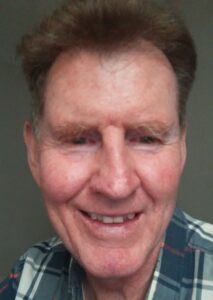
Kim Farleigh has worked for NGOs in Greece, Kosovo, Iraq, Palestine, and Macedonia. He likes painting, art, bullfighting, photography, and architecture, which might explain why this Australian lives in Madrid. More than 183 of his stories have been accepted by more than 107 different magazines.





